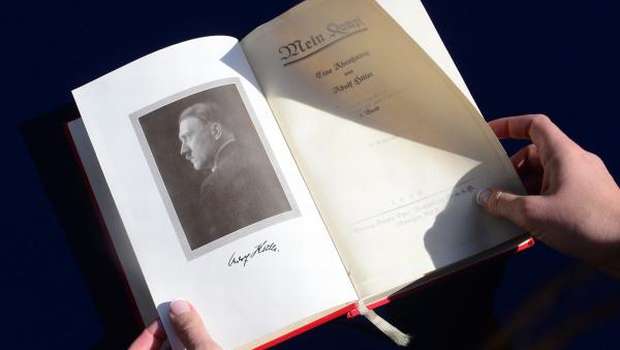In one year’s time the copyright to Mein Kampf (“My Struggle”) by Nazi leader Adolf Hitler will expire. After that, the book will become available to anyone wishing to publish it. According to German copyright law, a book enters the public domain 70 years after the author’s death. Mein Kampf’s copyright was registered again in Germany in 1945, and it was written by Hitler 20 years before that.
The book was very popular among Germans, selling a quarter of a million copies in 1933—enabling Hitler to purchase a new Mercedes. When his party won the elections that year and he took over as chancellor, he ordered the book be distributed for free to soldiers and newlyweds. Germany, which owns the rights to the book until the end of next year, now plans to ban its sale and distribution under its anti-terror laws.
This will also happen in Holland and Poland. But not all European countries have banned the book; it is still available in in France. The US also allows it to be sold and published. Racists and fascists, including Nazis, are in general allowed to distribute their publications and books. Two rare copies of Mein Kampf were sold in Los Angeles in a public auction a week ago.
It is clear that Germany’s attempt to ban Mein Kampf will not prevent the spread of its contents, thanks to modern technology and the ease of spreading ideas and publications despite legal measures against them—even in China and Russia, where anyone is punished for selling the book.
Will banning the book work? Arab governments which deal with the new technological reality with the same old mentality—pursuing and confiscating—are not alone in this as Germany too plans to prohibit Mein Kampf via the power of the law. So, will this prevent Nazi mentality and literature from being circulated underground?
Nazism is an ideology of hatred which appeals to sick and weak minds. It is present in almost all societies under different names and is based on rejecting others due to their race, religion, color, tribe or ideology. It is not exclusive to ignorant people and mobs, and is also adopted by members of elites and intellectuals who distinguish themselves by rejecting others from their social circles. Those who amplify this hatred are the political populists who find a way to advance themselves by appealing to people’s worst instincts. In Mein Kampf, Hitler incited much of German society, which was defeated in World War I, to blame the Jews, communists, gypsies and other communities who weren’t “pure” Germans. Who would have thought a book would lead the world to a moral crisis and a fierce war and the death of millions?
Mein Kampf, which is sold and celebrated even in the countries which Hitler despised, such as the Arab world and India, will be tested by our ability to defeat racism and promote the idea of co-existence in a world where borders are porous and the tone of hatred is increasing. There’s no single decisive solution to prevent the birth of a new Hitler anywhere in the world. The only way to confront the possibility is to fight hatred, both as an idea and a practice.
